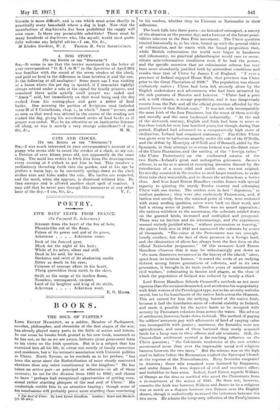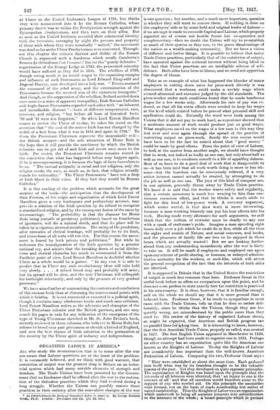BOOKS.
THE SOUL OF ULSTER.*
LORD ERNEST HAMILTON, as a soldier, Member of Parliament, novelist, philosopher, and chronicler of the first stages of the war, has already played many parts in the fields of action and letters. In one sense he breaks fresh ground in his new book, inasmuch as he has not, so far as we are aware, hitherto given permanent form to his views on the Irish question. But it is a subject that has exercised him all his life, in virtue not merely of family connexion and residence, but o' his intimate association with Unionist politics in Ulster. North Tyrone, as he reminds us in his preface, " has been the scene since the Redistribution of more closely contested elections than any other constituency in the kingdom." Ho has taken an active part—as principal or otherwise—in all of these contests; ho at for tho division from 1385 to 1892; and claims to have " perhaps had exceptional opportunities of getting occa- sional rather startling glimpses of the real soul of Ulster." His credentials entitle him to an attentive hearing ; though some of his conclusions will probably prove more startling than convincing • The Soul of Ulster. By Lord Ernest Hamilton. London : Bunt and Blackett. [ft. ed. net.]
to his readers, whether they be Unionist or Nationalist in their adhesions.
The book falls into three parts—an historical retrospect, a survey of the situation at the present day, and a forecast of the future possi- bilities inherent in the Sinn Fein movement. The Ulster question treated historically is, in his view, bound up with the general ethics of colonization, and he starts with the broad proposition that, while British colonization the world over began in harshness and inhumanity, no practical philanthropist would care to recon- stitute ante-colonization conditions even if he had the power; and the specific assertion that no colonization scheme has ever been more abundantly justified both by antecedent conditions and results than that of Ulster by James I. of England. " I: over a province of Ireland enjoyed Home Rule, that province was Ulster prior to the Great Plantation of 1609." The population was almost exclusively native ; Ulster had been left severely alone by the English undertakers and adventurers who had been attracted by tho rich pastures of Munster and Loinstor. " Ulster had a poor soil, a cold climate, a savage population, and it was dangerously remote from the Pale and all the official protection afforded by the armed forces of that British oasis." It was not only incomparably tho most Irish of the four Provinces, but the worst of them socially and morally and tho most backward industrially. " At the and of the sixteenth century, English and Irish had been in more or less close touch for over four hundred years, but though, during that period, England had advanced to a comparatively high state of civilization, Ireland had remained stationary." Pan-Celtic Ulster was given over to barbarous anarchy under the rule of the O'Noills, and the defeat by Mountjoy of O'Neill and O'Donnell, aided by the Spaniards, in their attempt to overrun Ireland was the direct cause of the Ulster Plantation, and the settling of the " foreign tribes" (the Ulster Protestants) on the confiscated estates of the two Earls—Ireland's great and =forgotten grievance. James's scheme, in so far as it aimed at remedying intestine discord by the introduction of a more solid and stable race, was not original. Its novelty consisted in the resolve to send larger numbers, to make them take their womenfolk, and to choose the settlers from a better class. And here Lord Ernest Hamilton credits James with special sagacity in quieting the unruly Border country and colonizing Ulster with one stroke. The settlers were in fact " deportees," in modern parlance ; they were also exclusively Protestants, and, if lawless and unruly from the national point of view, were endowed with many sterling qualities, never went back on their word, and had a strong sense of justice. There was no armed opposition ; the natives withdrew to the mountains, the colonists settled down on the granted lands, increased and multiplied and prospered. There was no friction and no intermarriage, and the experiment seemed entirety justified when, " without provocation or warning," the native Irish rose in 1641 and massacred the colonists by scores of thousands. "The crime of the Protestants was not =neigh- bourly conduct., but the fact of their presence in a foreign land, and the elimination of aliens has always been the first item on the official Nationalist programme." Of this massacre Lord Ernest Hamilton observes that it may be unhesitatingly put down as " the most disastrous occurrence in the history of the island," since, apart from its intrinsic horrors, " it sowed the seeds of an undying distrust among future generations of colonists, and in its own generation, it brought in its train twelve years of =intermittent civil warfare," culminating in famine and plague, at the close of which the population of Ireland was reduced by nearly a third.
Lord Ernest Hamilton defends Cromwell's methods as not more rigorous than the occasion demanded, and attributes his unpopularity with Irish writers of the Prendergast type, not to his severity with the sword, but to his banishment of the native Irish across the Shannon. This act earned for h.= the undying hatred of the native Irish, because it laid the foundation-stone of colonial stability in Ireland, and made it possible for the native lands to be occupied with security by Protestant colonists from across the water. His scheme of settlement, however, broke down in detail. The method of paying his soldiers' arrears in pay with allotments of land of varying value was incompatible with justice ; moreover, the Ironsides were not agriculturists, and most of them bartered their newly acquired lands for a lump sum to their officers and old residents. Still, tho Cromwellian settlement exerted a far-reaching influence on the Ulster question ; " the Calvinistic tendencies of the new settlers accentuated more than ever the impassable social and religious barriers between the two races." But the scheme was on the high road to failure before the Restoration exalted the Episcopal Church at the expense of the Nonconformists. Many Ironsides emigrated to America ; those who remained were harassed by Rapparees, and under James II. were deprived of civil and executive office.; and forbidden to bear arms. Indeed, Lord Ernest regards William of Orange as the dens ex machind who saved the Protestants from a re-enactment of the scenes of 1641. He does not, however, consider the Irish war between William and James to be a religious war so much as a dispute between two Princes over the English throne, though it undoubtedly increased the bitterness between the two races. He admits the temporary adhesion of the Presbyterians
of Ulster to the United Irishmen's League of 1791, but thinks they were manoeuvred into it by the Roman Catholics, whose primary desisn was to utilize the Presbyterian strength against the Episcopalian i'resbyterians, and then turn on their allies. But as soon as the United Irishmen revealed their substantial identity with the terrorists, outraging by night the persons and property of those with whom they were nominally " united," the movement was dead so far as the Ulster Presbyterians were .concerned. Through- out this chapter the writer's distrust and dislike of the Roman Church is expressed with a frankness which recalls Gambetta's
famous Le elericalieme c'eee But for the " purely defensive " organization of the. Orange Lodge in 1795, the persecuted minority would have suffered as they did in 1641. The rebellion of 1798, though owing much in its initial stages to the organizing energies and influence of such Protestants .as Lord Edward Fitzgerald and Begone,' Harvey, soon developed into a holy war. " Priests assumed the command of the rebel army, and the extermination of the Protestants became the avowed aim of the victorious insurgents." And though, on the suppression-of the rebellion, Ireland settled down once more to a state of apparent tranquillity, Irish Roman Catholics and Anglo-Saxon Protestants regarded each other with " an inherent and ineradicable distrust "—born of different temperament, race, interests, and religion, " but before all born of historical facts. '98 and '41 were not forgotten." So when Lord Ernest Hamilton comes to review the Ulster of to-day, he takes his stand on the assertion that " the soul of the native Irish has not Changed by the width of a hair from what it was in 1641 and again in 1798." To them the Protestant Ulstermen represent the unspeakable evil— the British usurper—and the sole attraction of Homo Rule is the hope that it. will provide the machinery by which the British colonists can be got rid of and Irish soil revert once more to the Irish. Per contrd, the Protestant -Ulsterman remains rooted in the conviction that what has happened before may happen again. If he is uncompromising, it is because the logic of facts forceshim to be so. " The mutual antipathy is racial and not religious, only the religion masks the race, so much so, in fact, that religion actually stands for nationality." The Ulster Protestants " have not a drop of Irish blood in their veins. If they had they would be Roman Catholics."
It is this reading of the problem which accounts for the great ourpriso of the book—the anticipation that the development of Sinn Feinism, of the origin and organization of which Lord Ernest Hamilton gives a very inadequate and perfunctory account, may provide a solution of the Irish question by its refusal to recognize a standardized religion,-and by the consequent fusion of the races by intermarriage. " The probability is that the clamour for Home Rule being (outside of predatory politicians) based on foundations of ignorance, will die a natural death, and that its place will be taken by a vigorous internal socialism. The swing of the-pendulum, after centuries of clerical bondage, will probably be to its limit, ; and iconoelasm of all sorts will run riot. For this reason the move- ment is feared by both priests and politicians." But while he welcomes the transfiguration of the Irish question by a genuine national cry, and admits that the breaking down of racial distinc- tions and clerical obstacles has much to recommend it from the Paeificist.point of view, Lord Ernest Hamilton is doubtful whether Ulster as a whole would be a gainer. " In any case it is safe to .predict that in -Ulster any such revolutionary ideas will take hold very slowly. . . . A mixed breed may and probably will arise ; but. its spread will be slow, and the true -Ulsterman will relinquish his birthright reluctantly, and only by the pressure of very gradual, proceeses."
We have aimed rather at summarizing the contents and conclusions of this curious book than at discussing the controversial points with which it bristles. It is not conceived or executed in a judicial spirit, though it contains many wholesome truths and much sane criticism. Lord Ernest Hamilton writes as the advocate and champion of the Ulster Protestant colonist and the British garrison, and one may search his pages in vain for any indication of the emergence of the type of Young Ulsterman sketched in Mr. St. John Ervine's book, recently reviewed in these columns, who believes in Home Rule, but . refuses to brood over past grievances or cherish a hatred of England, and sees the best chance of Irish salvation in the permeation of the country by the Ulster spirit of industry and independence.



























 Previous page
Previous page